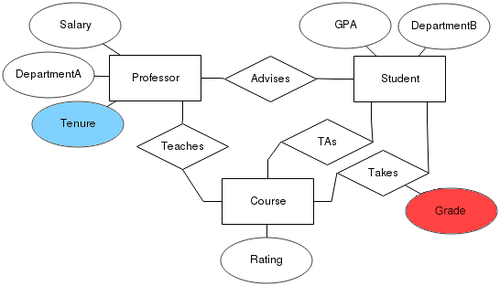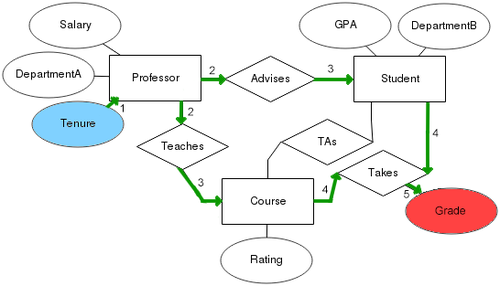Paper
Explore further on GitHub.
Updates
- (2019-12-16): Harsha Kokel extended this in “Just-another Walk-ER” (GitHub, ReadTheDocs).
Overview: Modes Made Easy


Modes are a way of way of expressing knowledge about the relationships between entities. Something similar to them is used in various relational reasoning and probabilistic logic learning frameworks in order to constrain the search space for possible hypotheses.
Perhaps you have social network data involving people, who they are friends with, their smoking status, and whether they developed lung cancer. The modes to describe their relationships would look like this:
useStdLogicVariables: true.
setParam: treeDepth=4.
setParam: nodeSize=2.
setParam: numOfClauses=8.
mode: friends(+Person, -Person).
mode: friends(-Person, +Person).
mode: smokes(+Person).
mode: cancer(+Person).
bridger: friends/2.
Unless you’re an expert in Inductive Logic Programming, it might not be immediately obvious what these mean. The key idea of this paper is that we can encode the same information using Entity Relationship Diagrams, which should be familiar to anyone who has written SQL queries or is familiar with relational databases.
This also allows a user to specify Advice in terms of what variables will (or will not) be useful for learning a relationship, providing a means for domain experts to encode their knowledge about the system.
Citation
If you build on this code or the ideas of the paper, please consider citing.
Alexander L. Hayes, Mayukh Das, Phillip Odom, and Sriraam Natarajan. 2017. User Friendly Automatic Construction of Background Knowledge: Mode Construction from ER Diagrams. In Proceedings of the Knowledge Capture Conference (K-CAP 2017). ACM, New York, NY, USA, Article 30, 8 pages. DOI: https://doi.org/10.1145/3148011.3148027
@inproceedings{hayes2017userfriendly,
author = {Hayes, Alexander L. and Das, Mayukh and Odom, Phillip and Natarajan, Sriraam},
title = {User Friendly Automatic Construction of Background Knowledge: Mode Construction from ER Diagrams},
booktitle = {Proceedings of the Knowledge Capture Conference},
series = {K-CAP 2017},
year = {2017},
isbn = {978-1-4503-5553-7},
location = {Austin, TX, USA},
pages = {30:1--30:8},
articleno = {30},
numpages = {8},
url = {http://doi.acm.org/10.1145/3148011.3148027},
doi = {10.1145/3148011.3148027},
acmid = {3148027},
publisher = {ACM},
address = {New York, NY, USA},
}
